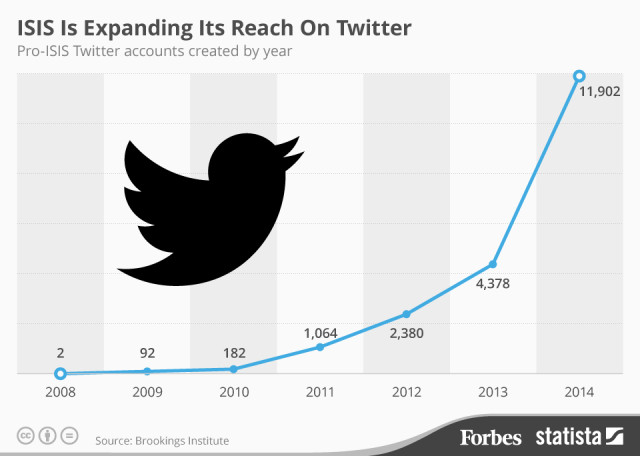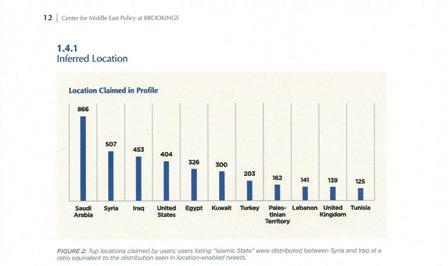Brookings Study of ISIS Twitter Accounts Reveals U.S. among Top Targets
A Brookings Institution examination of a complete data set of 20,000 ISIS Twitter accounts ranked Saudi Arabia, Iraq, Syria and US as the top four locations of twitter users, The ISIS Twitter Census: Defining and Describing the population of ISIS supporters on Twitter. The authors of the ISIS Twitter census are J.M. Berger and Jonathan Morgan. Berger “is a non-resident fellow with the Project on U.S. Relations with the Islamic World at Brookings and the author of Jihad Joe: Americans Who Go to War in the Name of Islam (Potomac Books, 2011) and ISIS: The State of Terror (Ecco, 2015).” Morgan “is a technologist, data scientist, and startup veteran. He runs technology and product development at CrisisNET, Ushahidi’s streaming crisis data platform, and consults on machine learning and network analysis. Morgan is also co-host of Partially Derivative, a popular data science podcast.” The Brookings ISIS Twitter project was “commissioned by Google Ideas and published by Brookings”.
The Brookings Saban Middle East Center think tank has had a close relationship with the Obama National Security Council. Use of social media by Islamic extremist groups like ISIS figured prominently in President Obama’s recent, Summit to Counter Violent Extremism. See our March 2015 NER article, ‘Did President Obama’s Violent Extremism Conference Fail?‘
Notwithstanding the provenance of the Brookings Twitter Census report, the data and methodology are credible and revealing of how ISIS and supporters use social media. The authors noted three classes of Twitter users as a precaution interpreting the study results:
Covert supporters of ISIS:
Users who took medium to strong steps to conceal their support due to fear of prosecution or suspension by Twitter. Users who took only casual steps to disguise their support were generally detectable.
Pro-ISIS intelligence operatives:
Some users who follow accounts related to the enemies of ISIS, such as rival jihadists, would be coded as non-supporters under the conservative criteria we employed.
Anti-ISIS intelligence operatives:
These are accounts created to appear as ISIS supporters in order to allow ISIS’s enemies to monitor its activities, which would be coded as supporters (if done effectively).
Here is the Twitter Census Data Snapshot drawn from the Brookings study:
Best estimate of total number of overt ISIS supporter accounts on Twitter: 46,000
Maximum estimate of ISIS supporter accounts on Twitter: 90,000
Number of accounts analyzed for demographics information: 20,000
Estimated percentage of overt ISIS supporters in demographics data set: 93.2 percent (+/- 2.54 percent)
Period over which data was collected: October 4 through November 27, 2014, with some seed data collected in late September 2014
Top Locations of Accounts: “Islamic State,” Syria, Iraq, Saudi Arabia, U.S.
Most common year accounts were created: 2014
Most common month accounts were created: September 2014
Number of accounts detected using bots and deceptive spam tactics: 6,216 using bot or spam technology for some tweets; 3,301 accounts were excluded from the Demographics Dataset for primarily sending bot or spam content
Average number of tweets per day per user: 7.3 over lifetime of account, 15.5 over last 200 tweets by user
Average number of tweets per user (Over lifetime of the Account): 2,219
Average number of followers: 1,004
Smartphone usage: 69 percent Android, 30 percent iPhone, 1 percent Blackberry
Among the principal findings from the Brookings Twitter Census were:
- From September through December 2014, the authors estimate that at least 46,000 Twitter accounts were used by ISIS supporters, although not all of them were active at the same time.
- Typical ISIS supporters were located within the organization’s territories in Syria and Iraq, as well as in regions contested by ISIS. Hundreds of ISIS-supporting accounts sent tweets with location metadata embedded.
- Almost one in five ISIS supporters selected English as their primary language when using Twitter. Three quarters selected Arabic.
- ISIS-supporting accounts had an average of about 1,000 followers each, considerably higher than an ordinary Twitter user. ISIS-supporting accounts were also considerably more active than non-supporting users.
- A minimum of 1,000 ISIS-supporting accounts were suspended by Twitter between September and December 2014. Accounts that tweeted most often and had the most followers were most likely to be suspended.
- Much of ISIS’s social media success can be attributed to a relatively small group of hyperactive users, numbering between 500 and 2,000 accounts, which tweet in concentrated bursts of high volume.
Based on their analysis, the authors concluded:
Recommend social media companies and the U.S government work together to devise appropriate responses to extremism on social media. Approaches to the problem of extremist use of social media, Berger and Morgan contend, are most likely to succeed when they are mainstreamed into wider dialogues among the broad range of community, private, and public stakeholders.
Our assessment is that given the close Brookings Middle East Center liaison with the Obama National Security Council and Undersecretary of State for Public Diplomacy, Richard Stengel, the latter tasked with social media counter messaging, that little follow will occur. That is reflected in Google sponsorship of this Brookings Twitter Census report and overarching concerns of social media like Facebook, Google YouTube, Twitter and Instagram about maintaining Constitutional guarantees of free speech. These social media would prefer to establish their own criteria for suspending terrorists and supporters accounts. Monitoring and development of metadata from ISIS Twitter supporters in the West, especially in the US and the UK, should be left to counter terrorism intelligence echelons or private groups like SITE Intelligence Group and effective individuals like our colleague Joseph Shahda. Congressional Homeland Security and Select Intelligence Committees should hold hearings and investigations into current terrorist social media surveillance, especially for those US ISIS accounts identified in the Brookings ISIS Twitter Census. Shahda commented after reading:
The only way to stop the terrorists propaganda and recruitment is to keep shutting down all their means of communications which means all their social media (Facebook, Twitter) accounts as well as their websites.
EDITORS NOTE: This column with graphics originally appeared in the New English Review.


